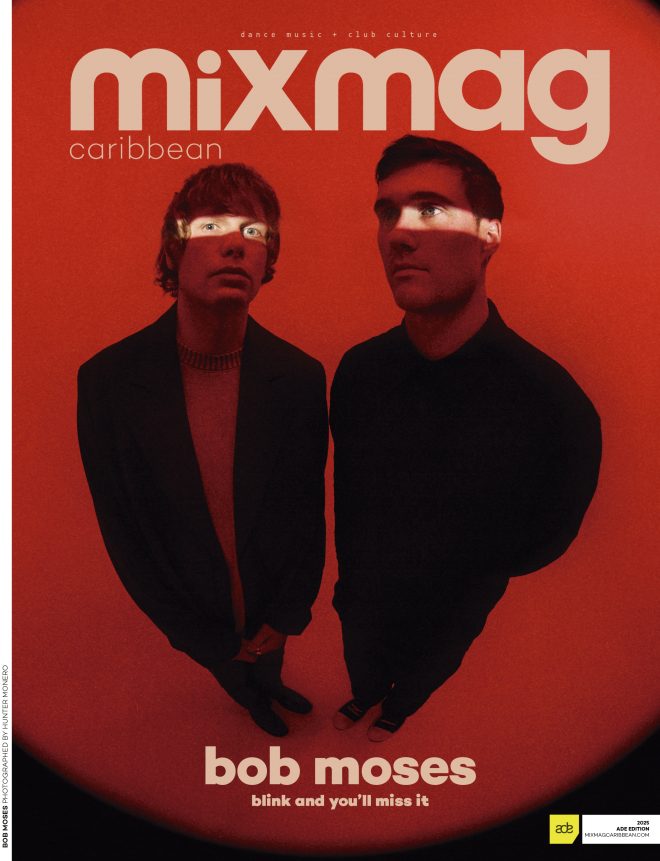BOB MOSES | 2025 ADE EDITION
Bob Moses: Blink and You’ll Miss It

There is something almost cinematic about the journey of Bob Moses. What started in the warehouses of Brooklyn more than a decade ago has grown into one of the most compelling stories in electronic music. Tom Howie and Jimmy Vallance built their identity on the tension between live performance and club culture, guitars and synthesizers, emotional songwriting and hypnotic grooves. That balance has made them Grammy winners, festival headliners, and trusted architects of late-night memories.
But success has not dulled their sense of wonder. If anything, the deeper their career goes, the more questions they ask of themselves. They speak about chasing creativity like a mirage, about the sleepless chaos of fatherhood colliding with life on stage, about the hunger that never fades even after topping radio charts and selling out Red Rocks. They talk about BLINK, their most confident album yet, a body of work that explores fleeting moments, collaborations that pushed them into new spaces, and the realization that music is always a dialogue between the personal and the universal.
In our interview, we dive into the duality of their lives. From raising kids to raising dancefloors, from fleeting bursts of studio magic to the slow work of crafting an album, from the freedom of creative maturity to the humility of still chasing the next song. This is Bob Moses today, a duo that has learned to live in the moment while never losing sight of the future.

From warehouses to fatherhood
The story of Bob Moses has always been about dualities. From the shadows of Brooklyn warehouses to the spotlight of global festival stages, from late-night chaos to the quiet grounding of family mornings, their journey is marked by constant contrasts. Today, fatherhood adds another layer to that balance, reshaping not only their daily lives but also the way they see themselves as artists.
For Jimmy Vallance the contrast could not have been starker. One week he was pacing the sleepless nights of new fatherhood, the next he was stepping onto the stage of Red Rocks as a headliner.
“In retrospect it was totally insane,” he recalls. “I was in this state of sleep deprived, delirious twilight. Two of the most special moments of my life happening right next to each other was really wild.”
Tom Howie has his own version of that collision between two worlds.
“It’s a total trip to be out rocking a huge crowd at a festival and then come home to little people who don’t care at all and just go, ‘Dad, make me my pancakes already.’ It’s humbling, but it makes us better performers and better artists.”
That mix of chaos and grounding has reshaped the way Bob Moses see themselves. No longer only entertainers, they carry the awareness of shaping memories for others while living through milestones of their own.
“On stage, if I’m in my head or something isn’t sounding right, I’ll think of my kids and how carefree and expressive they are. I try to channel that. It reconnects me to the most basic human truths, dancing, music, having fun.” Tom says.
Jimmy: “I don’t have the luxury of being indecisive anymore. There’s so much to do with Bob Moses, and kids in the mix forced me to eliminate wasted time. I trust my instincts more, and honestly, that’s for the better.”
That transformation spills into their music. Fatherhood has made their creative time precious and sharpened their focus.
“Each moment you can steal for yourself becomes essential. We’ve learned to carve space for family and still protect our time to make music.”
Jimmy: “It’s softened us in a good way. Nothing connects you to pure love the way children do, and that makes it easier to communicate emotions honestly in our songs.”
That honesty runs through tracks like Last Forever and Blink, where the desire for time to stand still meets the reality that it never does.
“Songs often reveal themselves later. You realize they’re about the purity of love and the sadness of knowing it can’t last. You blink and it’s gone.”
For Bob Moses the warehouse days may have been about the adrenaline of the moment. Today those same moments carry new weight, fleeting and fragile, but also more powerful than ever.

The hunger that never fades
For most artists, a Grammy win, a number one single and nights at Red Rocks would be the summit. For Bob Moses, those milestones are chapters, not destinations. Success has never quieted the voice inside that asks for more. If anything, each peak has only sharpened their awareness of how fleeting achievement can be, and how fragile creativity feels when you depend on it for a living. The hunger, they admit, never goes away.
“That bar or marker will probably always move,” Jimmy admits. “We might imagine that having enough money or accolades will create that feeling, but deep down we know it won’t. Part of it comes from how unlikely it was to even have a career in music in the first place. There is always this feeling that we’ll wake up from the dream and it will be gone. Creativity doesn’t belong to you, it just arrives, and you catch it. So there’s always that wondering, did we just get lucky, will it happen again?”
Tom sees “enough” less as a milestone and more as a state of acceptance.
“It probably has more to do with coming to terms with the nature of creativity and having faith in the future than any specific benchmark we could ever hit or anything we could acquire.”
That philosophy shapes how they view their achievements. On paper, Bob Moses have crossed monumental thresholds. Yet the moments never feel final, only transitional.
“Having a number one song on the radio was one of those,” Tom reflects.
“Love Brand New was at the top of alternative radio for weeks in the US and Canada, and we even got a little trophy. It was great, and we’re proud of it, but it just felt like another step on the journey.”
Jimmy:“That may also be because the way people consume music now is so different from when we were growing up. The meaning of having a number one on the radio isn’t the same as we might have imagined it. It was a cool achievement, but it didn’t feel quite like we expected.”
What that taught them, Tom says, is how to redefine ambition itself.
“It speaks a lot to the nature of this album. Life is a series of moments that come and go in an instant, and the challenge is to be in each one while it happens. They might not look like you expected, and they’ll be gone before you can hold onto them in a way that makes them feel like yours. That’s the real work, staying present.”

Capturing time in a BLINK of an eye
Every Bob Moses record carries its own emotional weather, but BLINK feels different. It is an album preoccupied with time itself, with the fragility of moments that vanish as quickly as they arrive. For Tom and Jimmy, the theme is less a sudden revelation than a slow accumulation of years, of questions about life, loss, and meaning that finally crystallized into songs.
“It feels like the themes of BLINK have been percolating in us for a long time,” Tom says.
“We’ve finally reached a point in our creative journey when we could crystalize those ideas into songs in a direct way. I’ve always been obsessed with the meaning of life, of making sense of things, of finding the answer to big questions. This album is an attempt at accepting and understanding life in a way I never really have before. It’s a journey, we’re here for it, but it isn’t necessarily ours. We can’t hold onto moments or people or much of anything really, and we can be scared of that or try to come to terms with it.”
For Jimmy, the music takes shape in the unconscious.
“So much of the music making process is unconscious, and we like to let it be that way. We get better results when we get out of our own way and let the music flow. Everything in life makes its way into our music on its own. It doesn’t feel like we control it. Once we were into the writing process and these themes started to crystalize, that influenced the sounds and lyrics we were drawn to. Making an album is cool because the work you start collecting informs the next steps, but at the beginning we just try to shut off our minds and write honestly and see what comes out.”
The process behind BLINK was fragmented, stretched across cities, carried by Dropbox links and Discord calls. Yet instead of breaking the thread, distance sharpened their focus.
“To be honest, it wasn’t that much different from how we’ve made our last records except that it felt more focused,” Tom explains.
“Even when we’ve been in the same city we usually start little ideas separately and then show each other. This time it was just, hey I sent you a link, check it out. The routine felt familiar, only more disciplined.”
Jimmy found the separation demanding but ultimately liberating.
“We booked lots of studio time together throughout the process, but when we worked alone it forced us to be more focused. In the past if one of us wasn’t feeling it, the other might just carry on while you sat there. Alone in the studio, it’s either you do the work or you don’t. And because our families needed more attention, we had to be more disciplined with the time we had.”
Looking back, they are not sure if this approach will become the new norm or remain unique to this album.
“I think we’ll keep elements of it,” Tom reflects.
“Each process informs the next. It’s all about finding ways to channel inspiration, and we’ll cross that bridge when we get there. What makes making an album distinct is the focused effort of distilling all our little ideas into one body of work.”
Jimmy: “We’re just fresh off this batch of tunes. You never know how things will have changed next time. The world is moving very fast at the moment.”
Catching lightning in the studio
Some songs arrive slowly, built piece by piece. Others appear in a rush, as if the air itself demanded they be written. For the guys, Time of Your Life belongs firmly in the second category.
“We met up with John and Michel who we’ve worked with a few times before,” Jimmy recalls.
“We were just riffing on ideas. Later in the afternoon Michel played us this beat he had been working on, and it ended up being the beginning of Time of Your Life. We were both like, yo what is that, that’s sick. We asked if we could work on it, and we just started going. It all came together really fast.”
Tom:“It was really fun. We were in a studio with a little working room and then a live room, just going back and forth, building melodies and ideas on top of the beat. Once we got moving, all four of us were pacing around, throwing out ideas, getting super excited. We had the speakers cranked and were dancing around. I think that magic comes when it wants to, and it can’t really be recreated. The magic will come back in a different form, but those moments of inspiration are fun and special.”
That spark is only one part of the process, though. Behind every rush of inspiration comes the discipline of refinement, a stage that can either protect or smother a song’s essence.
“There is real danger in refining too much, and honestly, as we’ve done this longer that’s one of the main things we’ve realized,” Tom admits.
“It’s a hard balance, but you just have to do your best and hope it works out. Having trusted confidants to play things to really helps, because they can let you know when you’ve messed something up. With Tearing Me Up that almost happened. We overproduced it and had to pare it back to get it to where it is now.”
Jimmy sees both sides as essential rather than opposed.
“We are grateful for those moments of creative magic when they happen, but the slow work of making an album is a different process. They don’t really compete. You collect ideas, hopefully formed in as many of those magic moments as possible but sometimes just from more methodical tinkering. Once you’ve got a bunch of ideas you’re stoked on, the personality and shape of an album starts to emerge on its own.”

The sound in motion
Every Bob Moses record tells a different story. Days Gone By introduced their brooding grooves, Battle Lines carried the weight of rock and guitars, Desire stretched into conceptual club territory, and The Silence in Between reflected the heaviness of a world on pause. With BLINK the question was inevitable: is this the next step in a lineage, or a reset altogether?
Tom: “I think each album is innately a continuation of the journey, an evolution. BLINK feels like our freest album yet, our most mature. We are more confident in who we are and what we want to be, and we are comfortable there. Not comfortable in a lazy sense, but in a sense of confidence. I feel like we really got out of our own way and didn’t overthink this one. We let ourselves be very free in the making of it, and we also took what we learned from the previous steps of the journey. The lyrics are very honest, very direct, and really personal. They’ve always been that way, but this new chapter of life has given us a new perspective on life, on music, and on how much we love making it and are grateful to be able to do it.”
Jimmy: “If anything, this record felt more focused. We knew we wanted to make things for the dance floor, but also that felt very musical and song oriented. In the past we might have thought of those as separate, but this time we felt like, no, this goes together and this is who we are. That’s the confidence Tom spoke about. BLINK is us realizing that we’re on this beautiful journey, and we want to soak it all up and enjoy it as much as we possibly can. We’re super proud of the record and can’t wait for the world to hear it.”
Part of that confidence came from learning how to collaborate with intention. What began tentatively on earlier projects became a sharper tool during The Silence in Between, and now feels integral to their creative process.
Jimmy: “It feels like we really learned how to collaborate on The Silence in Between. We view collaborators like plug ins in the sense that each person has their own unique set of skills. It’s our job to choose the ones we need for certain goals on certain songs or ideas, just like you would use a plug in for a specific sound. On this album we felt more confident in how to use collaboration, and we really set out to treat it as a tool in that way.”
Tom: “It’s part of the confidence thing. We both know what we’re good at and how strong our partnership is, so we knew how to choose the collaborators who could amplify and highlight that. Shaun Frank really worked well with us on a few songs, helping us achieve one of our main goals, which was to reach certain production standards without compromising song craft. He has this rare blend of musicality and engineering chops that fit perfectly with what we do. He pushed us into new spaces, but always in a way that made us feel more like ourselves.”

Philosophy and perspective
Beyond the milestones, beyond the charts and stages, Bob Moses think of music as something closer to a mirage. The chase never ends, the magic never quite belongs to you, yet that is exactly what keeps them moving forward. BLINK captures this philosophy at a moment when their lives as artists and fathers intersect, forcing them to confront time, memory, and legacy with sharper honesty.
Jimmy: “I think it’s all one big mirage that can’t be caught. That’s the beauty and the frustration of the creative process. It really is just about being a channel for it and tuning in as best you can. You’ve gotta be grateful when you get something good and pure and powerful. That’s what all creative people are trying to do really, to tune into that frequency and catch magic. It sounds hokey, but there’s not really a better way to describe how it feels.”
Tom: “We’ve had a lot of great times and written a lot of music we’re proud of. It feels like we’re just getting started. We’d always encourage people to chase that magic because there is no better feeling than catching it. We grew up with music being the most powerful thing in our lives, our god so to speak, and it’s the way we’ve always made sense of the world and of life. To be able to make music from an honest place in ourselves and to have that go out into the world and have that same effect on other people is the ultimate gift and is definitely worth the chase. It’s something we are very grateful for that chance to do.”
That belief in music as both a record of the past and a signal toward the future is written all over BLINK.
Tom: “Each song is a combination of making sense of the past but also a message of hope for the future. Making music is a hopeful enterprise. You’re calling out to the universe with a part of yourself and seeing how it responds.”
Jimmy: “I hope we’ll remember this time in our lives that felt like a new chapter, the innocence of young fatherhood, the hope for the future, for our kids’ future. The happiness and peace we feel. Having young kids really puts you back into that place when you were a kid and everything was alright and that childlike wonder and freedom to explore and inquire is at the surface. So hopefully that came out in the music, juxtaposed with the uncertainty and scariness of dealing with new responsibility. Hopefully we remember that through it all it’s our love of making music that really grounds us and is where we feel most at home.”
The conversation became even more intimate when they considered which songs they would want their children to hear years from now, long after this chapter has passed.
Tom: “Probably Last Forever or Blink. I know that’s two. Those songs really encapsulate the themes of this album and this chapter in life for me. I wish that it could last forever, you blink and then it’s gone. The ephemeral nature of life and the beauty and sadness in that. That’s what we really grappled with in different ways on this album.”
Jimmy: “I’m gonna have to copy Tom on this one. Both of those songs feel like snapshots of the moment we are living in now. There’s a timelessness when you capture moments, like a photograph, in the way of a song. I know these songs will always take me back to the time, feeling and place we are in now.”
And of course, the philosophy of BLINK is not confined to headphones. It was made to be shared on stage, in different shapes, across both clubs and live concert halls.
Tom: “I think both. There are moments on the album that lend themselves more to the live band and some more to the club for sure, but I think a lot of what we’ve become more comfortable with is that it doesn’t have to be separate. Certain tracks work great in a club and then come alive in a new way with the band. We’re excited to bring it to life on stage and see what the songs do and what life they take on once they’re out in the world.”
Jimmy: “The dynamics in Blink are really interesting. It starts off as a ballad and slowly builds into this big, almost trance like ending. The song rises into the tag line, you blink and then it’s gone, and then immediately cuts out, which is counter intuitive to how you’d want a typical dance drop to go. But it makes it feel special. That moment really works so well with the words. I think it’s gonna be great in front of any crowd we play for.”
My Thoughts
Bob Moses have always lived in contrasts. From their earliest days in Brooklyn warehouses to headlining stages like Red Rocks, Tom Howie and Jimmy Vallance have carried the duality of live band intimacy and club-driven energy. With their new album BLINK, that tension feels more human than ever, colored by a new chapter in their lives: fatherhood. It is a record that does not just push their sound forward but also reflects the fragility and beauty of time itself.
Fatherhood has sharpened both their music and their perspective. Tom talks about channeling the carefree spirit of his kids when he feels stuck on stage, while Jimmy admits that parenthood stripped away indecision and forced him to trust his instincts. That honesty flows into the songs. Tracks like Last Forever and Blink carry the joy of connection alongside the sadness of knowing that nothing lasts. For the duo, family life has not only changed their routines, it has redefined how they see themselves as artists shaping memories for others.
Despite the Grammys, the radio hits, and the sold-out tours, they still speak openly about the insecurity of creativity. Jimmy calls it chasing a mirage: the fear that the magic might disappear, the humility of knowing you never fully control it. Tom, in contrast, describes creativity as an act of faith, a way of staying present in each fleeting moment. That paradox, success without finality and achievement without “enough,” is what fuels the hunger behind Bob Moses.
In BLINK, that hunger finds a new voice. The record feels freer and more confident than their past work, dissolving the old line between club tracks and songs. Collaborations with Michel Zitron, John Martin, and Shaun Frank opened new spaces without diluting the core of who they are. The result is music that can break your heart through headphones but also come alive on the dancefloor. It is an album that captures time in fragments: a Dropbox file here, a late-night session there, stitched together into something that feels whole and timeless.
What makes Bob Moses remarkable is how human they remain. They can speak about big stages and childhood pancakes in the same breath, about insecurity and gratitude with equal weight. And maybe that is why BLINK resonates so strongly. It is a reminder that music is not about holding onto forever, but about living fully in the moment while it is here. For anyone listening, especially those in vulnerable moments, songs like Last Forever arrive not as entertainment but as companions, fragile and powerful, reminding us that beauty often lies in what cannot stay.


